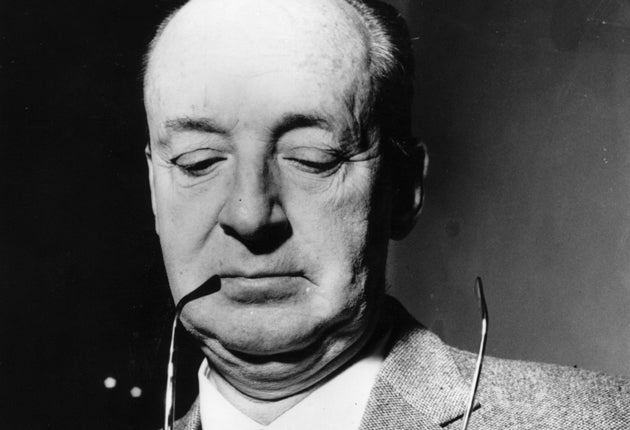Boyd Tonkin: How to ruin a great writer's good name
The Week in Books

Your support helps us to tell the story
From reproductive rights to climate change to Big Tech, The Independent is on the ground when the story is developing. Whether it's investigating the financials of Elon Musk's pro-Trump PAC or producing our latest documentary, 'The A Word', which shines a light on the American women fighting for reproductive rights, we know how important it is to parse out the facts from the messaging.
At such a critical moment in US history, we need reporters on the ground. Your donation allows us to keep sending journalists to speak to both sides of the story.
The Independent is trusted by Americans across the entire political spectrum. And unlike many other quality news outlets, we choose not to lock Americans out of our reporting and analysis with paywalls. We believe quality journalism should be available to everyone, paid for by those who can afford it.
Your support makes all the difference.What, apart from being dead and, in their different ways, remarkable, do the following authors have in common: Kingsley Amis, Saul Bellow, Roberto Bolaño, Jorge Luis Borges, William Burroughs, Italo Calvino, John Cheever, Ralph Ellison, Janet Frame, Allen Ginsberg, Czeslaw Milosz, Yukio Mishima, Edward Said, Susan Sontag, Hunter S Thompson, John Updike, Evelyn Waugh... and Vladimir Nabokov?
Their estates figure among the dozens administered by The Wylie Agency. In Nabokov's case, Wylie took over the management from the Smith-Skolnik agency in June 2008. Shortly before, it emerged that Vladimir's son Dmitri had after years of prevarication opted to publish the 138 index cards left behind by the author of Pale Fire, Ada and Lolita on his death in 1977.
Now, with a fanfare and palaver that would not disgrace a second coming, Penguin Classics has issued The Original of Laura (£25) in a luxury hardback design by Chip Kidd. The edition even offers – vanity of vanities – perforations around the facsimile cards so that obsessive Nabokov completists may re-arrange them at their will.
This is not a re-discovered masterpiece. It is not a novel of any kind, however embryonic. Rather, it consists of semi-isolated cells of prose, some beautiful and some banal, out of which the declining master might in time have fashioned a brief dismaying novella of ageing, betrayal and renunciation.
Dr Philip Wild, corpulent neurologist of independent means, is cuckolded over and again by his flighty damaged child-wife Flora: the original of the Laura that one of her lovers commemorates via a kiss-and-tell novel in which "the 'I' of the book is a neurotic hesitant man of letters". Pitiless, troubled Flora has in her disrupted ocean-crossing girlhood come under the sway (here completists will moan with joy) of one Hubert H Hubert, an unctuous creep of an English charmeur whose non-felonious attentions still feel to her like a "sticky invisible substance".
In these scarcely coherent fragments, a horror-struck bewitchment by the allure of the young body – with the "cup-sized breasts" of a 24-year-old that "seemed a dozen years younger than she", a gender-bending erotic dream, a "little bottom" forever "inset in the medallion" of memory, "romps with schoolmates of different but erotically identical sexes" – vies with Dr Wild's countervailing urge to flee the flesh and its abject prompts by cultivating a kind of death-like trance.
Wild ("I loathe my belly, that trunkful of bowels..."; I have never derived the least joy from my legs") somehow learns how to lose his toes. Metaphorically? Spiritually? Don't ask. Feet up, he endeavours to practise a blissful organ-by-organ deletion of his foul embodied self. "Dying by auto-dissolution" comes to appear to our portly sufferer as "the greatest ecstasy".
As a farewell cry of pain from a sick man still able to craft exquisite sentences but not to tell us how they connect or what they entail, The Original of Laura has a train-wreck fascination. As a vehicle for a multinational burlesque show of tempt and tease, with inflated claims now exposed as a fairground barker's boast, the whole business gives off a toxic stink. Worst of all, it tarnishes the Nabokov name. As Wild – or his creator? - advises at one stage: "Do not linger over your own ruins."
Andrew Wylie has in the past made a persuasive case that great authors' estates have not earned as much for their legatees as they deserve. Given the state of modern copyright law, his extraction of maximum value has its point. But this is not, by the longest of chalks, Penguin Classics' finest hour.
A silver lining comes in the form of Penguin reprints of Nabokov's Russian novels – such as Glory, Mary and The Luzhin Defence – and his peerless memoir, Speak, Memory. Each of these paperbacks – even the 84 pages of the proto-Lolita story, The Enchanter – will set you back £12. Fame has its price.
***
P.S. A cosmopolitan literary magazine has just reached a major birthday that merits loud ovations. We can leave the encomiums for the London Review of Books to the mid-Atlantic critical establishment that comfortably finds its own reflection there. Meanwhile, Wasafiri magazine, edited by Susheila Nasta, is celebrating 25 years of a genuinely global vision. The quarterly of international fiction, poetry, essays and visual art, once identified with a "post-colonial" perspective but now trans-continental in a more label-free style, has a special issue stuffed with good things. Contributors include Kamila Shamsie, Anita Desai, Fred D'Aguiar, Catherine O'Flynn, Sujata Bhatt and Moniza Alvi, alongside interviews with Doris Lessing (by Hermione Lee), Chinua Achebe and Linton Kwesi Johnson.
Details at: www.wasafiri.org
Join our commenting forum
Join thought-provoking conversations, follow other Independent readers and see their replies
Comments